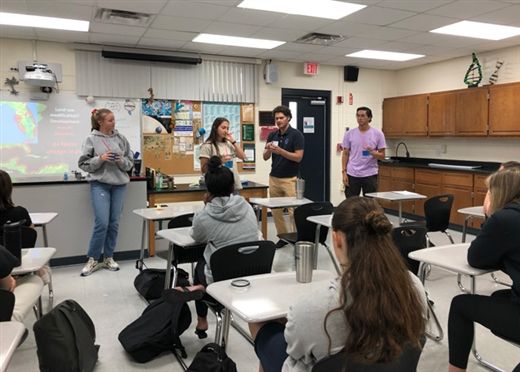

Mote Scientist visits US Honors Environmental Science Class
Source/Author: Stacy Alexander, Director of Alumni and Community Engagement
November 08, 2019
Mote Marine Laboratory Scientist, Dr. Phil Gravinese, spoke with Upper School students in Honors Environmental Science class last week on how environmental stressors, like ocean acidification, elevated seawater temperatures, and red tide impact the reproductive biology, development, and behavior of commercially important crustaceans (stone crabs, blue crabs, and spiny lobster).
During his talk, students were asked to demonstrate the effects of increased carbon dioxide in the ocean. By blowing oxygen into a water container dyed with blue coloring, the increased CO2 caused the pH to drop and the water to turn a light green. This demonstration replicated the effects of ocean acidification. Ocean acidification is caused by an influx of dissolved carbon dioxide. As atmospheric CO2 levels increase due to anthropogenic causes, dissolved CO2 also increases, which in turn decreases the pH of water.
Dr. Gravinese is investigating these multiple stressors with the goal of better understanding the 25% decrease in southwest Florida’s yearly stone crab catch since 2000, and informing resource managers working to help the fishery rebound.
Students asked thoughtful questions on the best sustainable seafood sources, how man-made impacts affect our coastal environments and how we can be part of the solution. By asking these questions, students proved that the expanded course offerings in Upper School make them well-informed citizens.
The Honors Environmental Sciences course is new to Upper Schools students this year and is taught by Dr. Ashley Grimaldi.
























